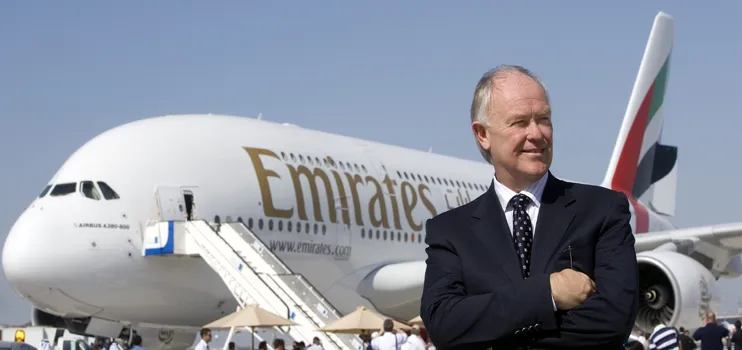
Emirates says 5G rollout in the US delinquent and irresponsible.
Jan 19, 2022

Emirates has criticized the rollout of 5G technology in the United States, labeling it as delinquent and irresponsible. The airline's concerns stem from the potential interference that 5G signals may have on aircraft safety systems, particularly altimeters. Emirates has highlighted the need for regulatory bodies to prioritize aviation safety over technological advancements. The airline emphasizes that a more cautious approach is essential to protect passengers and ensure safe air travel. This statement reflects broader industry worries about the balance between innovation and safety regulations in the rapidly evolving telecommunications landscape.
Understanding Emirates' Position on 5G Rollout in the US
Emirates, a leading airline renowned for its commitment to passenger safety and service quality, has voiced strong concerns regarding the rollout of 5G technology in the United States. The airline describes the situation as "delinquent and irresponsible," highlighting potential risks to aviation safety as the new technology is implemented near airports. This article delves into the implications of 5G rollout, particularly for the airline industry, and explores the ramifications of these developments.
The 5G Rollout: A Double-Edged Sword
The implementation of "5G technology" is intended to enhance communication speed and reliability, providing significant benefits to consumers and businesses alike. However, as Emirates articulates, there are serious concerns associated with its deployment. The airline industry relies heavily on advanced aviation technologies, including altimeters that can be affected by 5G signals. The proximity of 5G towers to airports raises alarms about potential interference with aircraft systems, which could compromise safety during critical phases of flight.
Key Concerns Raised by Emirates
Emirates has outlined several key concerns regarding the rollout of 5G in the U.S. These concerns can be summarized as follows:
| Concern | Description |
|---|---|
| Interference with Aviation Systems | 5G signals may interfere with altimeters, crucial for determining aircraft altitude, especially during landing. |
| Safety Risks | Potential for increased accidents and mishaps if altimeter readings are compromised. |
| Regulatory Inaction | Lack of comprehensive regulations addressing the integration of 5G technology in proximity to airports. |
| International Standards | Emirates advocates for alignment with international aviation standards to ensure passenger safety. |
Global Implications of 5G Rollout
The issues raised by Emirates are not only relevant to the U.S. but also have global implications. Other countries observing the "5G rollout" may take note of the challenges faced by the U.S. and adjust their own regulatory frameworks accordingly. This scenario emphasizes the need for a coordinated global approach to "telecommunications" and aviation safety, ensuring that advancements in technology do not come at the expense of public safety.
Industry Reactions
The airline industry has largely echoed Emirates' concerns about the rollout of 5G technology. Several airlines have expressed apprehension about the proximity of 5G towers to airports, leading to calls for stricter regulations and safety assessments. The Federal Aviation Administration (FAA) has been urged to take a more proactive stance in addressing these concerns, particularly as 5G technology becomes more prevalent across the globe.
Future of 5G and Aviation Safety
As the "5G landscape" continues to evolve, it is crucial for the telecommunications and aviation industries to collaborate closely. Developing solutions that ensure the safe integration of 5G technology into the aviation sector will require ongoing dialogue among stakeholders. Safety assessments, regulatory measures, and technological innovations must all play a role in ensuring that the benefits of 5G do not come with unacceptable risks.
Conclusion
Emirates' concerns regarding the rollout of 5G in the U.S. highlight a critical intersection between technological advancement and aviation safety. As the industry navigates these challenges, it is imperative to prioritize passenger safety while embracing the benefits of new technologies. The future of air travel will depend on a balanced approach that fosters innovation without compromising the safety standards that are paramount in the aviation sector.
In conclusion, Emirates’ strong stance on the 5G rollout serves as a reminder of the responsibilities that come with technological progress. The aviation industry must remain vigilant, ensuring that safety remains at the forefront of all developments as we transition into a more connected future.
Related Articles

Explore Thailand: The Best Islands to Visit for Paradise, Adventure, and Relaxation

The Ultimate Guide to the Best Islands in Thailand for Your Next Getaway

Do babies need passports? How to get a passport for a newborn

How to get a U.S. passport fast: here’s how to expedite the process

What is Mobile Passport Control: 5 reasons why you should use it

SENTRI vs. Global Entry: A detailed guide

Do you need a passport to go to the Bahamas? Let’s find out

Do you need a passport to go to Mexico? A detailed guide

Do you need a passport to go to Canada? We got the answer

Do You Need a Passport for a Cruise: An Essential Travel Guide

Booster Seat Requirements: All the Rules to Follow in Your Rental Car

What Are the World’s Most Powerful Passports, and How Does Yours Rank?

How to Take a Passport Photo at Home: A Helpful Guide

You've got to have heart! Southwest's new livery

Your opinion: Should water be free on low cost carriers?

Young women bolder than guys as solo travellers
